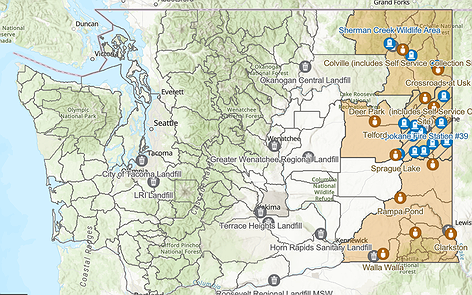WA elk hunters asked to keep an eye out for CWD
OLYMPIA — Elk hunters in Washington are gearing up for another season, as the general hunting season for Eastern Washington elk opened last Saturday, Oct. 26, followed by the western Washington elk season beginning Nov. 2.
Hunters are encouraged to actively participate in monitoring the health of elk populations by inspecting harvested elk hooves for abnormalities, a crucial step in reporting the prevalence of treponeme-associated hoof disease, according to a release by the Washington Department of Fish and Wildlife.
WDFW is asking hunters who harvest elk to closely examine the animal's hooves and document any deformities or unusual characteristics. This data will support WDFW's efforts to comprehend the distribution of TAHD, which poses a significant concern for elk health in the region.
For general season hunters in western Washington and most special permit holders, WDFW has introduced an exclusive draw opportunity, aiming to enhance TAHD monitoring. By submitting harvested elk hooves — particularly those exhibiting signs of hoof disease — hunters may enter a drawing for a premium elk tag for the following license year. These permits will facilitate hunting large, mature bull elk across expansive areas of western Washington outside traditional general seasons. For more information on this, visit https://bit.ly/ElkHoof.
However, this hunting season is marked by new regulations due to the confirmed presence of chronic wasting disease in the state. CWD, a fatal illness affecting cervids, has been detected in 35 states and four Canadian provinces. The disease is transmitted through bodily fluids and can lead to severe health issues in infected animals.
Hunters in game management units 124, 127 and 130 must comply with mandatory CWD testing for all harvested elk, deer and moose. Within three days of receiving a salvage permit, hunters are required to submit the entire head of the animal with at least three inches of neck attached to WDFW for testing. In addition, transport restrictions have been instituted for all harvested cervids from these units.
To further combat the spread of CWD, baiting for elk and deer is prohibited in these GMUs. Additionally, successful hunters must adhere to reporting requirements by collecting samples for CWD testing.
As the general elk season begins, WDFW wishes all hunters a safe and successful experience, urging them to be vigilant in monitoring wildlife health to ensure sustainable populations for generations to come.
 The map below shows important locations in Washington related to the detection of chronic wasting disease in the state. The hash marked area is the Incident Response Area, an area of intensive sampling for CWD. The orange area is the Transport Restriction Zone. Only limited items from harvested or salvaged animals can be taken outside of the TRZ. Hunter check stations, self-service collection sites, and landfills that accept carcasses for a fee are also included as layers on the map.
The map below shows important locations in Washington related to the detection of chronic wasting disease in the state. The hash marked area is the Incident Response Area, an area of intensive sampling for CWD. The orange area is the Transport Restriction Zone. Only limited items from harvested or salvaged animals can be taken outside of the TRZ. Hunter check stations, self-service collection sites, and landfills that accept carcasses for a fee are also included as layers on the map.

